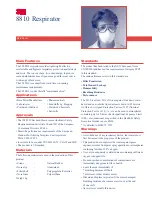
EN-2
Use of the mask:
•
Do not use the mask if it is not fully sealed. See the maintenance instructions.
•
Make sure that your hair is not caught between the mask and your face. The sealing of the mask is also affected by
beards, whiskers or temples of glasses
•
Always make sure that the breathing apparatus attached to the mask is suitable for the work in hand.
•
During normal use, breathe slowly and regularly.
•
Immediately leave the contaminated area if the mask or the attached respiratory equipment should fail.
•
Do not take the mask off before leaving the contaminated zone.
•
When removing the mask, take all necessary precautions to avoid inhaling the dust or contaminant retained on the
external surface of the mask.
Mask inspection and maintenance
•
Masks will be inspected by personnel qualified for maintenance and will involve replacing any damaged parts.
•
Any PANORAMASQUE mask exposed to strong radiant heat must be inspected. Check all the sensitive
components such as the visor, bottom, fasteners or fastening system, and their securing points, retaining strap
etc.
•
Any PANORAMASQUE mask exposed to a blaze must be replaced.
Removing the face mask
•
Push the buckle tabs forward with your thumbs to unfasten the harness.
•
Carefully pull the mask up over your head.
Cleaning instructions
•
Detach the breathing apparatus from the mask connector.
•
Wash the mask with a warm soap solution. Do not use organic solvents or abrasive products to clean the mask.
•
Rinse the mask thoroughly with clean running water.
•
Wipe the mask dry with a clean lint-free cloth and hang it by the neck strap in a well-ventilated place away from sunlight.
•
Once the mask is dry, clean the lens with a soft cotton cloth and ALTUSIL.
MAINTENANCE
Perform a monthly inspection of the mask to detect deteriorations, torn straps and faceblanks, split seals and valves. Do not use the mask
until worn or damaged parts have been replaced.
Mask maintenance schedule
Operation
Mask in operation
Mask in storage
Cleaning, disinfection
After each use
Not applicable
Air-tightness test on inspection bench
Every 12 months
Every 2 years
Change of valve, Seals
Every 2 years
Every 6 years
MAINTENANCE INSTRUCTIONS
Any work on the mask must be carried out by personnel qualified for maintenance.
Except for the changing of the speech diaphragm and the nut of the valve box, all maintenance operations can be performed without special
tools.
A sealing test must be performed on the inspection bench after any work on the mask.
Inner mask
•
Remove old inner mask.
•
Insert new inner mask, positioning its two holes Ø 27 into the grooves of the case.
Valve box and speech case
•
Remove the inner mask.
•
Hold tight valve box and speech case.
•
Unscrew nut with the help of the key intended for this.
•
Remove old valve box or speech case.
•
Position new valve box or speech case in the face blank and make sure that the faceblank rubber is correctly positioned.
•
Refasten nut and put back inner mask.
Содержание 1710650
Страница 2: ...Figure 1 Figure 2 ...





























